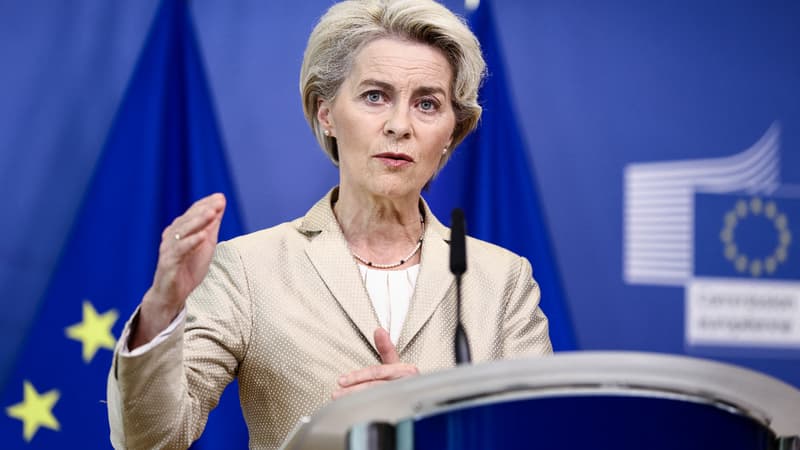European Commission President Ursula von der Leyen proposed on Wednesday to ease state aid to support the green transition of European industrialists in the face of US and Chinese subsidies, without new EU funding immediately. Her proposals will be discussed at a summit of EU heads of state and government on February 9-10 in Brussels, before decisions are made in March.
In addition to the subsidy component, they essentially consist of the redistribution of existing media, a “repackaging” of measures that has earned him criticism. “For the moment we must work with what we already have” and focus this money on clean technologies, argued Ms von der Leyen, as she opened the door to a European sovereignty fund, which will be proposed before the summer and would make it possible.” medium term” to invest in research or in capital of strategic companies.
The Commission plan provides for more flexibility to Member States in granting aid to companies dedicated to renewable energy (solar, wind, etc.) and the decarbonisation of industry (hydrogen, electrification, energy efficiency…) . Certain investments in new factories may, in particular, be backed by “tax advantages”.
Paris and Berlin satisfied
French Economy Minister Bruno Le Maire welcomed “strong proposals” that go in the direction of what Paris is asking for. His German counterpart praised “a very good proposal.” The two officials will travel to Washington on February 7 to negotiate adjustments to the $370 billion protectionist support plan decided by the US administration last summer. Ursula von der Leyen’s package represents an attempt to respond, controversial among the Twenty-seven and within the Commission itself.
The straitjacket on domestic subsidies has already been relaxed since the start of the pandemic in 2020. Opening it further risks benefiting big rich countries, mainly Germany and France, which could over-favor their companies to the detriment from its EU competitors. . “Any action we take must preserve the integrity of the single market,” Competition Commissioner Margrethe Vestager said, adding that the easing should be “temporary” and “targeted”.
To mitigate the risk of fragmentation of the single market, some countries, France and Italy in the lead, are calling for new common funding, such as the sovereignty fund. “If you have state aid, it must go hand in hand with funding at the EU level,” President von der Leyen acknowledged. This idea is rejected by several countries such as Germany, the Netherlands and Sweden, hostile to any increase in their contribution to the EU budget. “You can do economic policy without spending money,” German Finance Minister Christian Lindner said this week.
“Old wine, new bottles”
In the short term, the Commission is simply counting on the mobilization of existing funds, in particular the €800 billion European recovery plan (NextGenerationEU), with possible reallocations to increase the part currently dedicated to the green transition (€250 billion of euros). Brussels is also planning new legislation that will make it possible to set production targets in key sectors for European sovereignty, to support projects involving several European countries, accelerating and simplifying authorizations and financing.
“The Commission’s proposal is little more than old wine in new wineskins,” joked German Conservative MEP Markus Ferber. “The Commission’s project is necessary, but not sufficient,” said French MEP Valérie Hayer (Renew). “Settling for budget recycling will not allow us to achieve true sovereignty,” she criticized.
European companies are in a difficult situation. They face skyrocketing energy bills as the war in Ukraine has deprived the EU of access to cheap Russian gas. They have also suffered for years from China’s unfair practices. “Words and good ideas must now be quickly followed by concrete actions,” said Fredrik Persson, president of the European business organization BusinessEUrope, which is calling for a relaxation of regulations on EU companies.
Source: BFM TV


